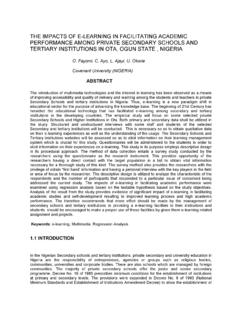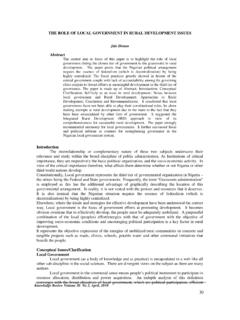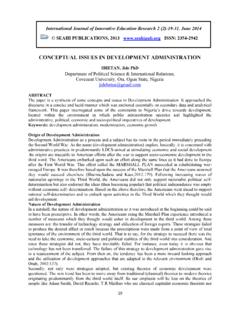Transcription of SMES FINANCING AND ITS EFFECTS ON NIGERIAN …
1 European Journal of Business, Economics and Accountancy Vol. 4, No. 4, 2016 ISSN 2056-6018 Progressive Academic Publishing, UK Page 37 smes FINANCING AND ITS EFFECTS ON NIGERIAN economic GROWTH Taiwo, PhD, ACIB Department of Banking & Finance, Covenant University, Ota, Ogun State, NIGERIA Falohun, Temitope, O. MSc Banking and Finance & Agwu M. Edwin PhD, MSc, MBA, BSc (Hons), NCE Associate Professor of Strategic Management and Marketing, School of Business, Covenant University, Ogun State, Nigeria AND Adjunct Lecturer and External dissertation supervisor for Global MBA students at Manchester Business School, UNITED KINGDOM BACKGROUND OF THE STUDY Small and Medium Enterprises play key roles in transition and developing countries (OECD, 2002). These firms typically account for more than 90% of all firms outside the white-collar jobs sector, constituting a major source of employment and generates significant domestic and export earnings.
2 OECD, (2005) stressed that SME development emerges as a key instrument in poverty reduction efforts, therefore, SME obviously contributes to economic , social development and poverty reduction. World Bank review on small business activities establishes the commitment of the World Bank Group to the development of the smes sector as a core element in its strategy to foster economic growth, employment and poverty alleviation (World Bank, 2012). This is because, smes constitute the driving force of such industrial growth and development and this is due to their great potentials in ensuring diversification and expansion of industrial production as well as the attainment of the basic objectives of development. Given the great potentials of smes to bring about social and economic development, it is of no surprise that the performance and FINANCING smes is of huge concern to the government of different countries in the world (Okpara 2000).
3 smes in both developing and developed countries play important roles in the process of industrialization and economic growth, by significantly contributing to employment generation, income generation and catalyzing development in urban and rural areas Hallberg, (2000); Olutunla, (2001); OECD, (2004); Williams, (2006). For instance, statistics shows that Africa and Asia has the majority of their population living in rural areas where smes delivers about 20% - 45% of full-time employment and 30% - 50% of rural household income (Haggblade and Liedholm 1991). However, FINANCING smes is a major catalyst and a key success factor for the development, growth and sustenance of any economy. Most government and business circles have come to recognize the importance of FINANCING smes and have consequently agreed that their growth constitutes one of the corner stone s of economic development (Olutunla,2001; OECD, 2004).
4 Despite the numerous factors that challenge the survival and growth of smes in both developing and developed countries, finance has been identified as one of the most important factor (UNCTAD, 2001; SBA, 2000). Having access to finance gives smes the chance to develop their businesses and to acquire better technologies for production, therefore ensuring their competiveness, however, there is a huge challenge for smes globally when it comes to sourcing for initial and expansion capital funds from traditional commercial banks. Abereijo and Fayomi (2005) notes that the majority of commercial bank loans offered to smes are often also limited to a period far too short to pay off any sizeable investment. In addition, banks in many developing countries prefer to lend to the government rather than private sector borrowers because the risk involved is lesser and higher returns are offered (Levitsky, 1997).
5 Such apathy for the smes have crowded out most private sector borrowers and increased the cost of capital for European Journal of Business, Economics and Accountancy Vol. 4, No. 4, 2016 ISSN 2056-6018 Progressive Academic Publishing, UK Page 38 them. This study therefore sets out to, among others, examine the various sources of FINANCING smes in Nigeria as well as assess the problems these smes faces in the formal and informal FINANCING of their activities. REVIEW OF RELATED LITERATURE Overview the importance of SME smes constitute essential ingredients in the lubrication and development of any economy. smes play a major role in economic growth in the OECD area, providing the source for most new jobs. Over 95% of OECD enterprises are smes , which account for 60%-70% of employment in most countries (OECD, 2005).
6 As larger firms downsize and outsource more functions, the weight of smes in the economy is increasing. In addition, productivity growth and consequently economic growth is strongly influenced by the competition inherent in the birth and death, entry and exit of smaller firms. This process involves high job turnover rates and churning in labour markets which is an important part of the competitive process and structural change. Less than one-half of small start-ups survive for more than five years, and only a fraction develop into the core group of high performance firms which drive industrial innovation and performance. This underscores the need for governments to reform policies and framework conditions that have a bearing on firm creation and expansion, with a view to optimizing the contributions that these firms can make to growth.
7 In Nigeria the contribution of smes has been recognized as main sustenance of the economy because of their capacity in enhancing the economic output and enhances human welfare. The problems bedeviling the smes in Nigeria are multi-faceted. Ekpenyong (1997) and Utomi (1997) identified inadequate capital, inaccessible credit facilities. Long term development institutional credit was known not to be available to smes because they are generally considered high credit risks by financial institutions. The study by Evbuomwan, et al. (2012) indicated that of their survey respondents relied mostly on own funds to finance their businesses. However, the smes lack of access to relative cheap and effective sources of finance has been identified as the major factor hindering their contribution to economic growth.
8 A widespread concern is that the banking system in the sub sector (which supposed to be the major financier of smes ) is not providing enough support to new economic initiatives and in particular to the expansion of smes and agriculture sector. It is noted that commercial and the hitherto merchant banks which retained liquidity levels in excess of regulation have shown reluctance in FINANCING smes (Sacerdoti, 2005). While Micro Finance Institutions (MFIs) have expanded vigorously in a number of countries, the size of their credit remains limited, so that their support is not on the scale needed for many medium sized projects. Also, the interest rate on micro-credits is very high, due to large administrative costs in relation to their scale of operations (Mahmoud, 2005).
9 The primary focus of this study emanates from the fact that small scale enterprises owners do not have sufficient finance to carry on their businesses. The reason for this is not farfetched, low level of income basically. It is an established fact that smes face financial challenges. Several studies have identified financial constraint as the major obstacle to smes development in developing countries including Nigeria. For instance, Adelaja (2003) argued that lack of access to institutional finance has always constituted a pandemic problem for SME development in Nigeria. The problem of SME FINANCING has received the tremendous research efforts from researchers. In their findings, four problems in FINANCING smes have European Journal of Business, Economics and Accountancy Vol.
10 4, No. 4, 2016 ISSN 2056-6018 Progressive Academic Publishing, UK Page 39 become recurrent: the cost of capital; risk; the inappropriate terms on bank loans; and the shortage of equity capital. Over the years government has enacted various policies and introduced schemes aimed at FINANCING smes . However it is worrisome to note that SME up till date are starved of funds and the FINANCING problems keep reoccurring. Asaolu et al (2005) have deduced that the financial challenges limit the developmental role of smes . But this may not be true especially in the case of Nigeria where the informal sector, which is constituted largely by the smes play a very important role in the development of the nation s economy. There is serious doubt as to the success of smes to economic growth as regards accessibility of its funds.











